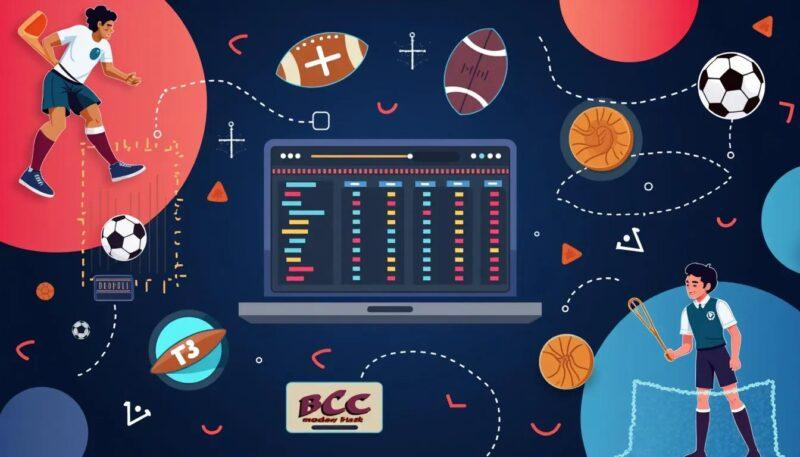In a world where sports have always been a source of passion and excitement, the recent wave of legalized sports betting has brought a new level of thrill to the game. However, as the trend spreads across the nation, it begs the question: what impact does legalized sports betting have on college students? Join us as we delve into the world of college sports enthusiasts and explore the potential consequences of this booming industry on the next generation of fans.
Overview of Legalized Sports Betting in College Settings
Legalized sports betting in college settings has been a topic of much debate and controversy in recent years. With the overturning of the Professional and Amateur Sports Protection Act (PASPA) in 2018, many states have since legalized sports betting, including on college sports. This has raised concerns about the potential impact on college students.
One major concern is the potential for increased problem gambling among college students. With easy access to betting on their favorite college teams, students may be more tempted to place bets, even if they cannot afford to lose money. This could lead to financial difficulties and even academic issues for some students. Additionally, there is the concern of match-fixing and point-shaving scandals, as athletes or coaches may be more susceptible to bribery or manipulation.
On the other hand, proponents of legalized sports betting argue that it can bring in much-needed revenue for colleges and universities. By partnering with sports betting operators, colleges can potentially generate funds to support athletic programs, scholarships, and other initiatives. However, it is crucial for safeguards to be in place to protect the integrity of college sports and the well-being of student-athletes and non-athlete students alike.
The Influence of Sports Betting on Student Behavior and Academic Performance
Sports betting has become increasingly prevalent in society, with the legalization of such activities sparking a wave of interest among college students. The allure of potentially winning big on a sports bet can be enticing, but the impact on student behavior and academic performance is a topic that deserves exploration.
Behavioral Impact: With easy access to online betting platforms, students may find themselves spending more time and money on sports betting instead of focusing on their studies. The thrill of placing a bet and watching the game unfold can be addictive, leading to distractions and poor decision-making. This can result in decreased productivity, increased risk-taking behavior, and potential financial strain.
Academic Performance: Studies have shown a correlation between excessive sports betting and poor academic performance. Students who are preoccupied with betting on games may neglect their responsibilities such as attending classes, completing assignments, and studying for exams. This can ultimately lead to lower grades, academic probation, or even dropping out of school altogether.
Identifying Potential Risks and Harmful Effects on College Students
Legalized sports betting has the potential to have a significant impact on college students, both in terms of risks and harmful effects. One concern is the increase in problem gambling among young adults, which can lead to financial difficulties, mental health issues, and strained relationships. College students may be particularly vulnerable to developing gambling addictions due to their age, peer influence, and lack of experience in managing money.
Furthermore, the easy accessibility of sports betting through online platforms and mobile apps makes it even more challenging for college students to resist the temptation to gamble. The convenience of betting from the comfort of their dorm rooms or smartphones can blur the lines between entertainment and addiction. The pressure to keep up with friends or capitalize on “hot tips” can also push students into risky behavior that they may later regret.
| Effects of Legalized Sports Betting on College Students: | Impact: |
|---|---|
| Increased problem gambling | Financial difficulties, mental health issues, strained relationships |
| Easy accessibility through online platforms and mobile apps | Blurred lines between entertainment and addiction, peer pressure |
It is crucial for college campuses to address the potential risks associated with legalized sports betting and provide resources for students who may be struggling with gambling-related issues. Education on responsible gambling practices, counseling services, and support groups can help mitigate the harmful effects and promote a healthy relationship with sports betting among college students.
Implementing Supportive Strategies and Resources for Students Affected by Sports Betting
Sports betting has become increasingly popular among college students, with the legalization of sports betting in many states. This trend has raised concerns about the potential negative consequences for students, including financial problems, academic performance issues, and mental health struggles.
It is essential for colleges and universities to implement supportive strategies and provide resources to help students affected by sports betting. Some effective measures could include:
- Creating educational programs to raise awareness about the risks of sports betting
- Offering counseling services for students who may be struggling with gambling addiction
- Setting up support groups where students can share their experiences and seek advice
By taking proactive steps to address the impact of legalized sports betting on college students, institutions can help create a safer and healthier environment for their students.
Recommendations for Universities to Address the Challenges of Legalized Sports Betting
As the landscape of sports betting continues to evolve with more states legalizing the activity, universities are facing new challenges in ensuring the well-being of their students. In light of these developments, it is crucial for institutions of higher education to proactively address the potential impacts of legalized sports betting on college students. Below are some recommendations for universities to consider:
- Education and Awareness: Implement educational programs to inform students about the risks associated with sports betting, including addiction and financial troubles.
- Support Services: Provide resources such as counseling services and support groups for students who may be struggling with compulsive gambling behavior.
- Policy Development: Develop clear policies regarding sports betting on campus to ensure compliance with state regulations and to promote responsible behavior among students.
By taking a proactive approach to addressing the challenges of legalized sports betting, universities can help ensure the well-being and success of their students in an ever-changing landscape.
Q&A
Q: What is the overall impact of legalized sports betting on college students?
A: The impact of legalized sports betting on college students can vary depending on individual involvement and response to the new gambling opportunities.
Q: How does legalized sports betting affect the mental health of college students?
A: Legalized sports betting can potentially increase anxiety and stress among college students who are more susceptible to developing gambling addictions.
Q: What measures can colleges and universities take to address the impact of legalized sports betting?
A: Colleges and universities can implement educational programs and resources to raise awareness about the risks of gambling and provide support for students struggling with gambling-related issues.
Q: How does legalized sports betting influence the academic performance of college students?
A: Legalized sports betting has the potential to distract college students from their academic responsibilities and impact their ability to focus on their studies.
Q: What are the ethical considerations surrounding college students engaging in sports betting?
A: College students engaging in sports betting raise ethical concerns related to underage gambling, integrity in sports, and potentially harmful behaviors associated with addiction.
Q: How can college students navigate the social pressures of sports betting in a legal environment?
A: College students can seek peer support, set personal boundaries, and practice responsible gambling behaviors to navigate the social pressures of sports betting in a legal environment.
Final Thoughts
In conclusion, the impact of legalized sports betting on college students is a complex and evolving issue that requires careful consideration. As we continue to explore the effects of this growing industry, it is important to consider the potential risks and benefits for young adults who may be particularly vulnerable to the lure of gambling. By staying informed and engaged in the conversation, we can work towards promoting responsible behavior and supporting the well-being of all individuals in our community. Thank you for joining us on this exploration of the impact of legalized sports betting on college students.






